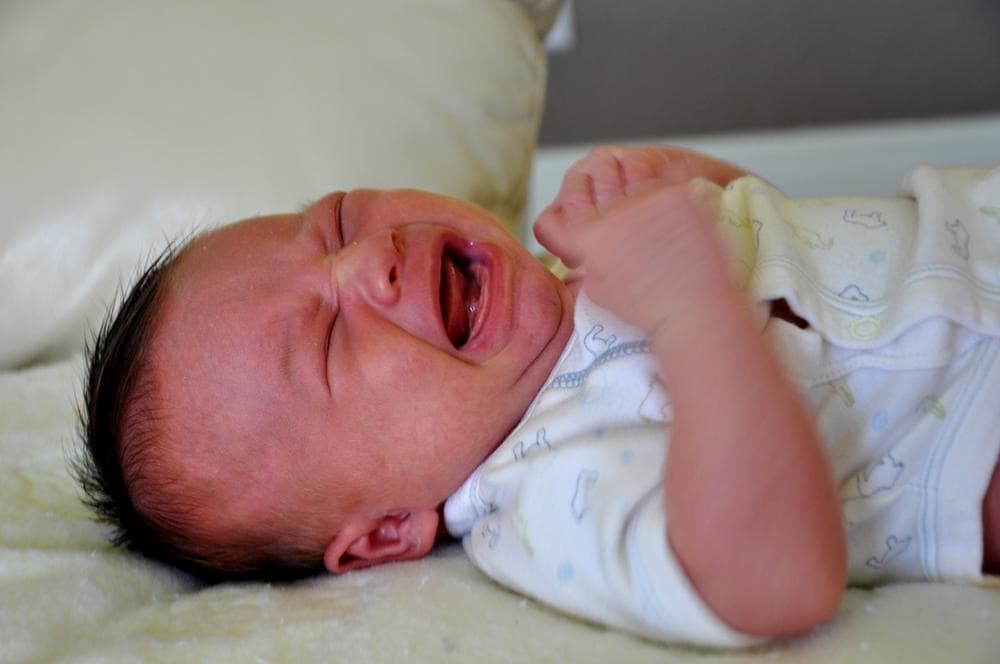Advertisement
Study: Depressed Moms Wake Sleeping Babies Unnecessarily

File this under: Good Intentions, Bad Outcomes.
A new government-funded study found that depressed, worried mothers were more likely to wake up their sleeping babies (and wake them unnecessarily) than non-depressed moms. This, in violation of perhaps the most important rule of mothering: Don't, under any circumstances, wake a sleeping baby.
This study makes me sad because this was me: The overwrought new mom hovering over the totally fine baby to the point she woke up, confirming my worst fears (that I had a baby who wouldn't sleep) and keeping me in a constant state of sleep deprivation (and depression) until she was about 5. But I did learn, and I'm pretty sure I let go a bit with my second daughter, leaving us both in peace at night.
Here's the news release from Penn State:
"We found that mothers with high depressive symptom levels are more likely to excessively worry about their infants at night than mothers with low symptom levels, and that such mothers were more likely to seek out their babies at night and spend more time with their infants than mothers with low symptom levels," said Douglas M. Teti, associate director of the Social Science Research Institute and professor of human development, psychology and pediatrics.
This in turn was associated with increased night waking in the infants of depressed mothers, compared to the infants of non-depressed mothers," Teti said. "Especially interesting about this was that when depressed mothers sought out their infants at night, their infants did not appear to be in need of parental help. They were either sound asleep or perhaps awake, but not distressed."
In contrast, mothers with low levels of worry and depressive symptoms rarely woke their infants out of a sound sleep and hardly went to their infants at night unless the infants were distressed.
The researchers also found evidence that infants who wake often during the night can lead to higher depressive symptoms in mothers, but the evidence for this infant-driven pathway was not as strong.
The two biggest concerns new parents report to pediatricians are sleeping problems and feeding problems. While Teti and colleague Brian Crosby, lecturer in psychology, do not discount parents' concerns for their child's well being, they note that there is probably no reason to wake a soundly sleeping baby if the child is not experiencing any distress. They emphasize that if parental depression or worry disrupts both the parents' and the infant's sleep, it could have negative consequences for the parent-child relationship over the long term. In situations like these, steps might be considered to help reduce parents' distress, they report in today's (Apr. 17) issue of Child Development.
"One has to examine the health of the family system and address the problem at that level," said Teti. "If frequent infant night waking is waking parents up every night and causing parental distress, there are established interventions to help babies learn how to develop self-regulated sleep."
However, if increased infant night waking is caused by distressed mothers waking their babies out of a sound sleep or keeping them up at night unnecessarily, other approaches might be considered. These include attempts to alleviate maternal depressive symptoms, reduce unnecessary worries about infant sleep behavior at night, encourage spousal support, and provide information to parents about the benefits of a good night's sleep for both the parent and the baby.
The researchers found mothers' depressive symptoms were significantly correlated with the mothers' feelings of helplessness and loss of control. Mothers' feelings of helplessness and loss of control, in turn, were related to close physical contact between mothers and babies, but were not related to night waking. Only mothers' nighttime behavior with their infants, not their behavior with their infants at bedtime correlated with infant night waking.
As part of the larger Study of Infants' Emergent Sleep Trajectories (SIESTA), Teti and Crosby collected data on 45 infants — from one to 24 months — and their parents over seven consecutive days, including an infant sleep diary that the mother kept. At the start of the week, the mothers also completed two surveys — one looked at depressive symptoms, while the other measured mothers' worries about their infants when they woke up at night.
On the sixth day of data collection, researchers set up several video cameras — one focused on where the baby slept, one focused on the door to the baby's room to see who was coming in and out of the room, and an additional one or two cameras focused on areas where the parent took the infant during any nighttime interventions. The cameras captured between 10 and 12 hours of video for each family, starting with the infant's bedtime.
What the researchers observed on the videos correlated with what the parents reported.
"In terms of understanding what predicts parenting at night, and how parenting at night affects children, it's important to examine parenting at night much more closely than we have," said Teti. "There's probably a lot going on at night that we need to understand, and we need to use actual observations of what parents are doing. We know very little about nighttime parenting."
This program aired on April 17, 2012. The audio for this program is not available.
